
Chives, scientific name Allium schoenoprasum, is a species of flowering plant in the family Amaryllidaceae that produces edible leaves and flowers. Their close relatives include the common onions, garlic, shallot, leek, scallion, and Chinese onion.

The shallot is a botanical variety of the onion. Until 2010, the shallot was classified as a separate species, Allium ascalonicum. The taxon was synonymized with Allium cepa in 2010, as the difference was too small to justify a separate species.
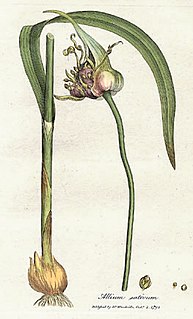
Garlic is a species of bulbous flowering plant in the genus Allium. Its close relatives include the onion, shallot, leek, chive, Welsh onion and Chinese onion. It is native to South Asia, Central Asia and northeastern Iran and has long been used as a seasoning worldwide, with a history of several thousand years of human consumption and use. It was known to ancient Egyptians and has been used as both a food flavoring and a traditional medicine. China produces 76% of the world's supply of garlic.
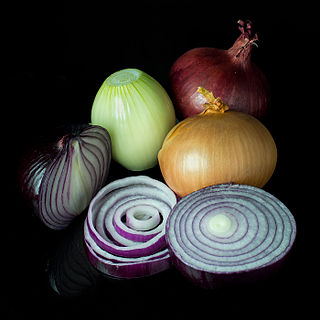
The onion, also known as the bulb onion or common onion, is a vegetable that is the most widely cultivated species of the genus Allium. The shallot is a botanical variety of the onion which was classified as a separate species until 2010. Its close relatives include garlic, scallion, leek, and chive.

Scallions are vegetables derived from various species in the genus Allium. Scallions generally have a milder taste than most onions and their close relatives include garlic, shallot, leek, chive, and Chinese onions.

Allium tuberosum is a species of plant native to the Chinese province of Shanxi, and cultivated and naturalized elsewhere in Asia and around the world.
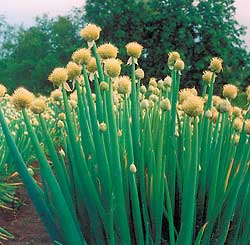
Allium fistulosum, the Welsh onion, also commonly called bunching onion, long green onion, Japanese bunching onion, and spring onion, is a species of perennial plant, often considered to be a kind of scallion.
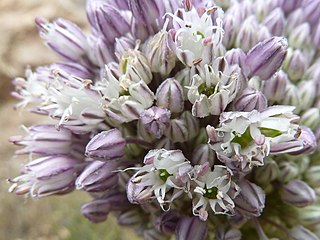
Allium ampeloprasum is a member of the onion genus Allium. The wild plant is commonly known as wild leek or broadleaf wild leek. Its native range is southern Europe to western Asia, but it is cultivated in many other places and has become naturalized in many countries.

The Dzungarian Alatau is a mountain range that lies on the boundary of the Dzungaria region of China and the Zhetysu region of Kazakhstan. It has a length of 450 km (280 mi) and a maximum elevation of 4,464 m (14,646 ft).

Allium monanthum, the Korean wild chive, is a spring vegetable with minuscule bulbous roots that have a mild onion flavor and found in the woodlands of Korea, Japan, northeastern Russia (Primorye), and northeastern China.

Allium chinense is an edible species of Allium, native to China, and cultivated in many other countries. Its close relatives include the onion, shallot, leek, chive, and garlic.

Allium caeruleum is an ornamental bulbous plant of the onion genus, native to Central Asia. In these regions, it is found on dry slopes, plains, and steppes.
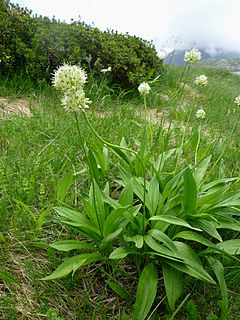
Allium victorialis, commonly known as victory onion, Alpine leek, and Alpine broad-leaf allium is a broad-leaved Eurasian species of wild onion. It is a perennial of the Amaryllis family that occurs widely in mountainous regions of Europe and parts of Asia.

Allium cyathophorum is a Chinese species of flowering plant in the onion genus Allium of the family Amaryllidaceae. It grows at elevations from 2700 metres up to 4600 metres.
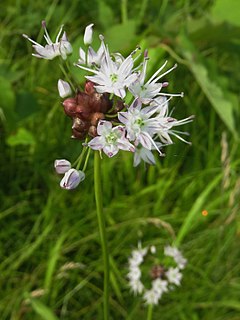
Allium macrostemon, Chinese garlic, Japanese garlic or long-stamen onion, is a species of wild onion widespread across much of East Asia. It is known from many parts of China, as well as Japan, Korea, Mongolia, Tibet and Primorye. It has been collected from elevations ranging from sea level to 3000 m.

Allium thunbergii, Thunberg's chive or Thunberg garlic, is an East Asian species of wild onion native to Japan, Korea, and China. It grows at elevations up to 3000 m. The Flora of China recognizes A. tunbergii and A. stenodon as separate species, but more recent sources combine the two.

Allium is a genus of monocotyledonous flowering plants that includes hundreds of species, including the cultivated onion, garlic, scallion, shallot, leek, and chives. The generic name Allium is the Latin word for garlic, and the type species for the genus is Allium sativum which means "cultivated garlic".

The leek is a vegetable, a cultivar of Allium ampeloprasum, the broadleaf wild leek. The edible part of the plant is a bundle of leaf sheaths that is sometimes erroneously called a stem or stalk. The genus Allium also contains the onion, garlic, shallot, scallion, chive, and Chinese onion. Three closely related vegetables, elephant garlic, kurrat and Persian leek or tareh, are also cultivars of A. ampeloprasum, although different in their uses as food.
















